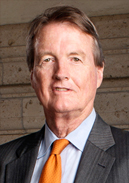No one had a résumé like Bill Powers.
Three years in the Navy. Professor of jurisprudence and legal process to thousands of students over three decades. Dean of the University of Texas School of Law for five years. President of UT for a decade. Author of some of the most cited books and articles on torts in the U.S.

“Mostly, I like being known as a teacher,” Powers said in an interview with The Texas Lawbook in 2015.
Powers, 72, died Sunday morning from complications from a fall he experienced in September, according to UT officials.
“Bill was a great leader blessed with a remarkable array of talents,” said Harry Reasoner, a partner at Vinson & Elkins. “He was a great, nationally recognized scholar. It gave him the insight as to what the faculty needed to perform at the highest levels and what was needed to recruit outstanding faculty members.
“What I admire most was the courage and skill he used in protecting the university’s stature during the regime of a hostile governor and the regents he appointed who did not support maintaining a world class university,” Reasoner said.
Praise of Powers is widespread in the legal community.
“Professor Powers was one of my favorite professors,” said Quantlab Chief Legal Officer Tim McInturf of Houston. “He was engaging, entertaining, and obviously enjoyed interacting with students inside and outside of class.
“He is the closest professor I ever had to the Robin Williams character from the movie Dead Poet’s Society,” McInturf said. “Rather than just teaching us the in’s and out’s of a subject, he was always trying to get us to see how the relevant law – and we as future lawyers – fit into the big picture of our society.”
“Bill was arguably the most loved and respected lawyer in the state of Texas,” Jackson Walker managing partner Wade Cooper said Sunday. “Because of his strong leadership at UT, we often forget what a significant influence Bill was on torts.
“He was one of the towering legal minds of this generation,” said Cooper, who had Powers for torts during his first year at law school.
David Beck, a partner at Beck Redden in Houston, described Powers as “a brilliant teacher, a thoughtful law school dean and a visionary as president of UT Austin.”
“He led UT through some turbulent times, but always steered the university on an innovative and demanding course,” Beck said. “Many of the milestones we are now reaching were begun with Bill.”
Powers’ successes at UT were many, including overhauling the undergraduate curriculum, leading a $3.1 billion fundraising campaign, launching the ESPN-owned Longhorn Network and negotiating the creation of the Dell Medical Center.
After graduating magna cum laude from Harvard Law School in 1973 and clerking for a judge on the U.S. Court of Appeals for the Ninth Circuit for a year, Powers taught at the University of Washington School of Law for three years when UT came calling.
“I was teaching in Seattle and it was one of those gray, drab days when a best friend called about me applying for a position in Austin,” Powers told The Lawbook. “I remember my first day at Texas because it was the day Elvis died.”
Powers’ impact on UT is undeniable. He made diversity a priority and implemented policies and practices that quadrupled the number of minority students in the law school. In addition, he has been “very involved” in the defense of Fisher v. University of Texas, a lawsuit that challenged the university’s use of ethnicity as a factor in admissions. Powers directly participated in the selection of defense counsel.
“A diverse student body brings educational benefits that include a full exchange of ideas and thoughts when all the students come together, whether it is in the classroom or at campus events,” he said.
Powers argued 50 cases before the Texas Supreme Court and the state appellate courts. He was the co-reporter for the Restatement (Third) of Torts: Liability for Physical Harm and he was the co-reporter on the Restatement (Third) of Torts: Apportionment of Liability. He has authored scores of law review articles that have been published in the most prestigious journals.
Powers didn’t back down from controversy. He will forever be linked to the 2002 investigation into the fraud and corruption at Enron Corporation, as the final findings are identified as the “Powers Report.” The critique was in-depth and hard-hitting.
“Legal education today needs much more experimental learning through clinics, internships and a lot more interdisciplinary studies,” Powers said.
Those who know Powers best say he is a big fan of Homer – actually both Homers: the blind Greek poet and the animated patriarch in “The Simpsons.”
“It’s the best written material on television,” Powers told the Austin American-Statesman in 2005. “At the end of the day, you may notice that Homer, much as he just doesn’t get it, chooses life and chooses his family. It’s a very interesting and complex text in my opinion.”
In 2015, Powers undertook a new effort: he joined the Dallas-based law firm Jackson Walker as counsel. He continued teaching full-time at UT, but he also worked 10 hours a week with the firm’s appellate lawyers and with the younger lawyers on professional development.
“The law is still a noble profession,” he said. “It is our duty to make sure that the younger generations understand what that means.”
In 2015, The Texas Lawbook named Powers as one of the Lions of the Texas Bar.
